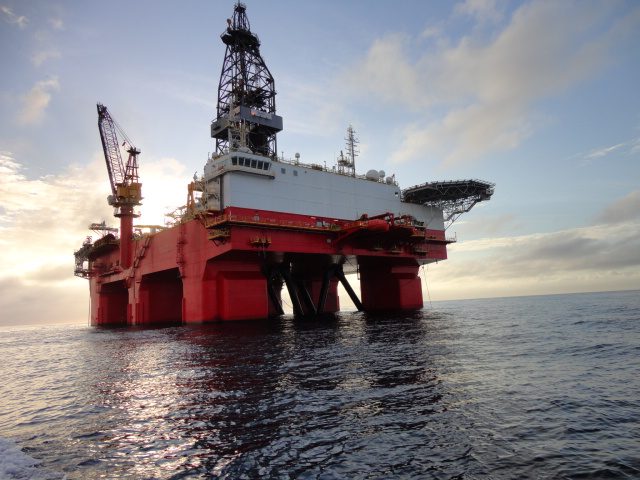File photo of Seadrill’s West Pegasus, via Captain Freeman
By Mikael Holter
Sept. 15 (Bloomberg) — Seadrill Ltd. suffered its longest losing streak in Oslo trading as the rig company controlled by billionaire John Fredriksen risks seeing its bet on Russia unwind on deepening sanctions from the U.S. and Europe.
Seadrill, the biggest offshore driller by market value, fell for an eighth straight day, the longest run since the company listed in 2005. It sank 3.2 percent to 195 kroner a share by the close in Oslo and is down 16 percent since Sept. 4.
The U.S. and European Union last week tightened sanctions targeting Russia’s energy industry and OAO Rosneft, its biggest oil company. The sanctions threaten to halt ExxonMobil Corp. drilling in Russia with one of Hamilton, Bermuda-based Seadrill’s rigs, and to affect contracts between Rosneft and Seadrill’s 70 percent-owned unit North Atlantic Drilling Ltd. for six offshore rigs from 2015 worth a total of $4.25 billion.
“One thing is that it would be negative for Seadrill’s earnings,” Janne Kverneland, an analyst at Nordea Markets, said by phone. It would lead to spare capacity and hurt “especially the North Sea market” as day rates for rigs keep falling on oil companies’ increased focus on spending discipline, she said.
Erased Gains
North Atlantic Drilling signed a framework agreement with Rosneft in May even as tensions mounted over Ukraine.
Gains in the stock following the announcement have been erased, with a 29 percent drop from a June 9 peak. The shares fell 5.9 percent to $8.10 by 11:02 a.m. in New York, a third day of losses. The company has dropped 17 percent since Sept. 11.
North Atlantic signed the five-year contracts for its six rigs on July 30, two days before the EU strengthened sanctions to include the transfer of technology used for shale, deepwater and Arctic oil exploration and production in Russia.
“Based on what’s emerged until now, it seems likely that the deal won’t go through as it stands today,” Robert Andre Jensen, an analyst at Sparebank 1 Markets AS, said by phone. “If you take out those contracts, you get lower visibility on the cash flow. It’s $4 billion in backlog that we don’t know will materialize.”
Sparebank 1 and Nordea both recommend clients sell Seadrill shares. Sparebank 1 has a neutral recommendation on North Atlantic, while Nordea has a hold recommendation.
‘Still Evaluating’
It’s not clear yet what the new sanctions mean for West Alpha’s current operations for Exxon and Rosneft in the Kara Sea or North Atlantic’s contracts, none of which start before 2015, Rune Magnus Lundetrae, Seadrill’s chief financial officer, said by phone today. “We’re still evaluating,” he said.
If North Atlantic’s Rosneft deal falls through and the three floating units involved are kept idle for one or two quarters in the period from 2015 to 2016, Seadrill’s earnings before interest, tax, depreciation and amortization could be 4 percent to 9 percent lower with unchanged rig rates, Nordea’s Kverneland said in a note to clients yesterday.
“In reality, day rates will likely be lower, implying further potential downside,” she said.
Copyright 2014 Bloomberg.

 Join The Club
Join The Club











